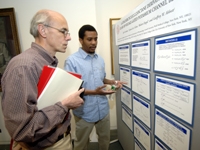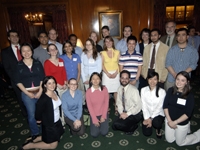Emerging from their laboratories on May 3, students in the Graduate School received their first taste of professional life at the Vincent du Vigneaud Symposium, a campus-wide showcase of science.
Since 1981, the Symposium has devoted a day for students to present their research in front of their colleagues and faculty. This year's Symposium drew attendees from both Weill Graduate School and Cornell's Ithaca campus to Rockefeller Research Laboratories at Memorial Sloan-Kettering Cancer Center.

Weill Cornell graduate student Earl Gordon, who received a du Vigneaud Award of Excellence, presents his research on potassium channels in excitable tissues to Erik Falck-Pedersen, professor of microbiology and immunology.
Dr. David Hajjar, dean of the Graduate School, deemed the symposium a grand tradition at Weill Cornell, offering graduating students not only a forum to share their work with colleagues, but also vital experience in leadership and professionalism, and the chance to build recognition and confidence in speaking clearly about their research.
"We are very proud that this Symposium is organized by the student body," Dean Hajjar said. "The du Vigneaud Symposium is an important event for the Graduate School not just because of the student research, but because the students alone give presentations in poster and large-group oral presentations. This is what they will be doing for the rest of their career."
The symposium honors Dr. Vincent du Vigneaud, a Nobel laureate and head of the Department of Biochemistry at Weill Cornell Medical College from 1938-1967.
Eighty-four posters brightened the portrait gallery of Rockefeller Research Labs, with 17 first-year students submitting entries. Eleven students had the chance to give oral presentations, since tradition dictates that only one can present at one Symposium per lifetime. Faculty from the Graduate School judged the presentations and posters on students' clarity in conveying their findings, taking the extent of group collaboration into consideration.
Seventeen entrants had traveled from Ithaca, mostly engineers and nanobiotechnology recruits, in a notable example of cross-campus collaboration.
Dr. Arthur Kornberg, the Emeritus Pfeiffer Merner Professor of Biochemistry at Stanford University School of Medicine, delivered the keynote address on enzymology.
The Symposium concluded with a reception at Griffis Faculty Club, with Dean Hajjar announcing the day's awards in three categories.

The winners celebrated their victory at Griffis Faculty Club.
Lisa Placanica, co-chair of 2005 Vincent du Vigneaud Committee, lauded the Symposium as an event woven into the Graduate School experience. "It's amazing that this student-run symposium has been around for 25 years," she said, "and I'm sure it will be around for 25 more."
Several students cited the opportunity to present, and the feedback it generated, as invaluable to their careers.
Michael Seidman, a fourth-year MD-PhD student in the Department of Pathology, received a du Vigneaud Award of Excellence for his work in identifying molecules used by white blood cells to migrate toward sites of inflammation.
"We hope to eventually identify strategies to either block inflammation, as in autoimmune disorders, or stimulate it, to fight off infection or cancer," he said. "We have evidence that several of our interventions could already be applied to treating inflammatory diseases such as arthritis, and we hope to discover many more applications in the future."
"The Symposium was the first chance I've had to present this particular project to a non-specialist audience, thus forcing me to think clearly about how the work can best be communicated and how it fits into the larger picture of biomedical science as a whole," Seidman added.
Kristin Burns, a graduate student in biochemistry at Cornell University, gathered a du Vigneaud Award of Excellence for researching certain pathogens' role in making vitamin B6, based on her study of how vitamins are synthesized.
"People have different perspectives on your research that force you to look at certain aspects you never considered previously," Burns said. "You come back with ideas and insights to re-motivate you."
Barry Kappel, a student in the Department of Pharmacology, picked up a du Vigneaud prize for his investigation of therapies for the removal of specific T-cells – an alternative to complete T-cell depletion – to minimize risk for infection in patients with autoimmune disorders.
"More than anything else, the Symposium allows me to reflect on and gather my work from the past year, put it together and show it to my peers," Kappel said. "It has served as a benchmark, as each year I have set goals to meet by the following year's Symposium. I am proud to be a part of it."
First-Year Awards
Polloneal Jym Ocbina
Ting Jia
Asif Maroof
Vincent du Vigneaud Prizes
Posters
Peter Rahl (Cornell University)
Ming Wong
Gaorav Gupta
Erin Bank
Talks
Kiersten Henderson
Ting Jia
Barry Kappel
Vincent du Vigneaud Awards of Excellence
Kristin Burns (Cornell University)
Michael Seidman
Meera Mani
Jeanne Farrell
Ensar Halilovic
Sumit Niogi
Smita Shankar (Cornell University)
Karen Wu (slide presentation)
Earl Gordon
Asma Hatoum (Cornell University)
Photos by Amelia Panico.

